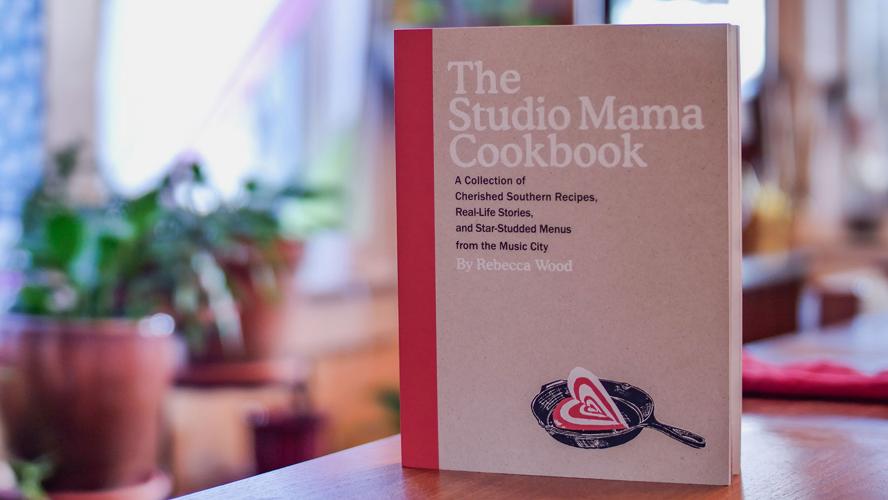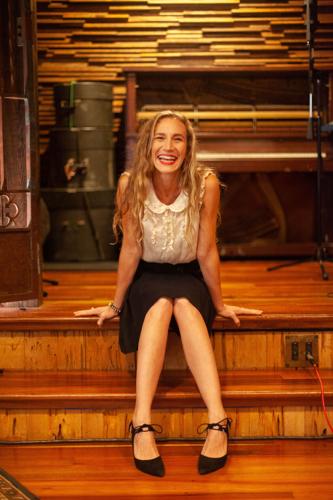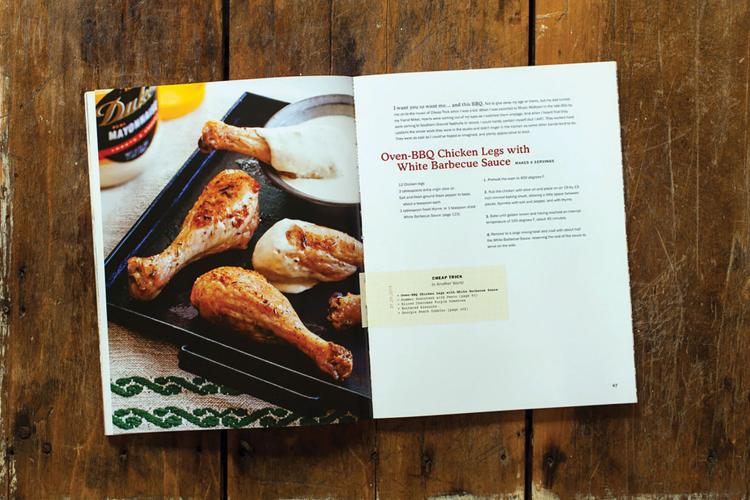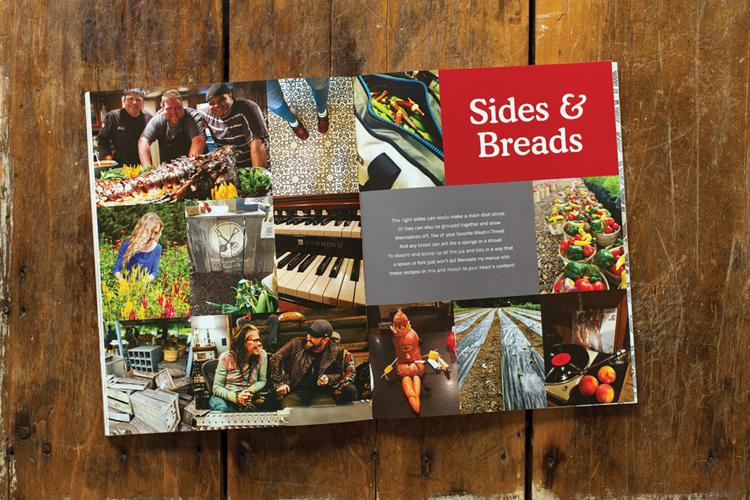
Rebecca Wood
On a recent Tuesday at Grimey’s New and Pre-Loved Music, a crowd stands between the stacks of records eating deviled eggs and listening to Rebecca Wood. She’s speaking about snapping peas with her grandparents and picking warm cucumbers off the vine from their garden.
While it might sound like a slightly unusual topic for a place that sells records by everyone from Margo Price, Kendrick Lamar and Sturgill Simpson to Gordon Lightfoot, The Kinks and The Human League, the occasion couldn’t feel more at home. Wood is in discussing her new book The Studio Mama Cookbook: A Collection of Cherished Southern Recipes, Real-Life Stories, and Star-Studded Menus From the Music City with music writer and occasional Scene contributor Craig Havighurst.
While people often try to explain the connection between music and food, Rebecca Wood simply embodies it. Growing up with a drummer father and gardening grandparents, and now married to guitarist Oliver Wood of The Wood Brothers, she’s had experiences with music and food that blend together and flow like the spicy honey she drizzles on roasted vegetables and cornbread. It all just goes together, with each component adding a story or a memory and making the other better.
For example, Wood once made an impression on Zac Brown with a slice of carrot cake. She was attending a potluck with her husband at Brown’s house when the country-rock heavyweight was angling to work with The Wood Brothers. Brown came over to talk with them, raving about the cake.
“Have you tried this?” he asked.
“Yeah,” she told him, “because I made it.”
Wood had been running a baking subscription, setting up shop with a farmer friend out of her local YMCA — she called it Heart’s in the Mix. Fast-forward several years. The Woods had relocated from Atlanta to Nashville, and she needed a job. As part of her search, she reached out to Brown about administrative work at his newly opened studio Southern Ground Nashville in the former Monument Records space. She got the job. Then, when The Wood Brothers recorded in the studio early on, she cooked a meal for the band that prompted the studio team to ask if she might expand her responsibilities — “Can you do that for everybody?”
Brown gave Wood the “Studio Mama” title based on her ability to make people feel at home. She decorated the place, booked studio time, handled a lot of the bookkeeping and invoicing. And as she writes in the intro to The Studio Mama Cookbook, she “had the pleasure of roasting pastured chickens, simmering rich vegetable stews, tossing hearty salads, and baking sweet treats for the artists who recorded in the main room. As I prepared meals, aromas would waft into the tracking room, mixing smells with sound, and something alchemical was born.”

After nearly eight years of preparing menus and cooking at Southern Ground, Wood put her experiences into her book, which she released earlier this month.
“People were always asking me for recipes, and I kept good notes,” she says. “So when the studio closed [in 2020], it made good sense. I went through my notes and made a spreadsheet of my menus and realized all of my recipes that I had completed already. It seemed like it wasn’t starting from scratch.”
In addition to excellent recipes, Wood’s book is packed with insider stories and kitchen tips from the times she needed to cook on the fly or make do with what she had prepared and put up in the freezer — her stocks, salsas, sauces and black beans. She also tells of times she needed to stretch ingredients for larger groups. Sometimes an entourage — with staff, band and crew — included up to 40 people. Wood offers a peek into how she cooks, and we all would be better for it to follow her lead. For instance, she tells of the time she needed to whip up lunch in 30 minutes for Chris Stapleton. She pulled some of her salsa from the freezer, thawed it and then poached fish in the smoky-spiced tomatoes. Meanwhile, she cooked some polenta in stock, mashed in some goat cheese and added some rainbow chard to a skillet with olive oil.
The studio seemed to make a cozy home for these meals, with history and music in its bones. Built in the late 19th century, the building originally served as a Sunday school building for a church. But over its lifespan as a studio, it hosted the likes of Roger Miller, Kris Kristofferson, the Allman Brothers, Hank Williams Jr., Boots Randolph, Willie Nelson, Dolly Parton, Emmylou Harris, Neil Young, Taj Mahal, Shel Silverstein and countless others. Brown purchased the studio in March 2012, eventually welcoming the Foo Fighters, Leon Bridges, Cheap Trick, Shawn Mendes, Carrie Underwood, Dierks Bentley, Kacey Musgraves and others. Wood includes menus from those sessions and stories that give the dishes depth and character.

For example, her recipe for Smoky Stuffed Dates (dates with cream cheese, smoked almonds and cinnamon or cayenne) comes with a story about the time she served them for the studio’s first open house in December 2012. Scotty Moore — who played guitar with Elvis and in the 1970s owned the studio space, from which he operated his Independent Producers Corporation — talked with her about the pecky cypress wood on the walls. The wood adds to the aroma, vibe, “aesthetic and acoustics of the main tracking room,” she writes. “This variety of wood was harvested from the swamps of Louisiana. Its bug-eaten, spongy crevices and alternating smooth, hard surfaces create a distinctive warm resonance and natural reverb in the room.”
The textures she describes in the room work naturally alongside the textures and tastes in the recipes.
Wood’s story about her Kitchen-Sink Chicken Stew tells of a visit by Fred Foster, Monument Records’ founder and a producer for Dolly Parton, Kris Kristofferson and others. He came in for a video session during downtime in the studio, when the Southern Ground folks hosted and filmed talks with previous owners. While they hoped Foster might spend an hour, he was still telling stories eight hours later, Wood writes. When she noticed Foster seemed to have a head cold, she slipped into the kitchen to make some soup — a rich stock loaded with on-hand vegetables and herbs, like rosemary and thyme, field peas, corn, potatoes and winter squash.
Many of these recipes conjure the spirit of a community cookbook — dishes are concocted from various inspirations and passed from one kitchen to another. There are, for example, a tofu “Meatless Loaf” for a vegetarian drummer and enchiladas inspired by the wife of a bass player. The recipes — from turnip greens to sweet potato biscuits and that famous carrot cake — come alongside stories that make the world feel smaller too, like the time Megadeth’s Dave Mustaine was in the studio at the same time as the bluegrass band IIIrd Tyme Out. Over lunch, they connected about the uncle of a bluegrass player who had been Mustaine’s bus driver.
“It was beautiful,” Wood says of the book-writing process. “It was really fun.”
Only one recipe made her cry.

When friends used to ask her for her family’s pound cake recipe, Wood would offer to bake them one instead. But at the urging of her editor, she included the instructions for the cake in the book. Handed down from Annie Gwendolyn, a cousin who Wood says feels more like an aunt, it’s one she knows by heart and has adapted for serving with berries or smoked with mocha or dripping with ganache.
Sometimes recipes, like this one, feel like a special gift and invitation into another person’s world.
“It’s a tradition,” she writes, “that weaves through generations and across all the webbed extensions of relatedness.”








